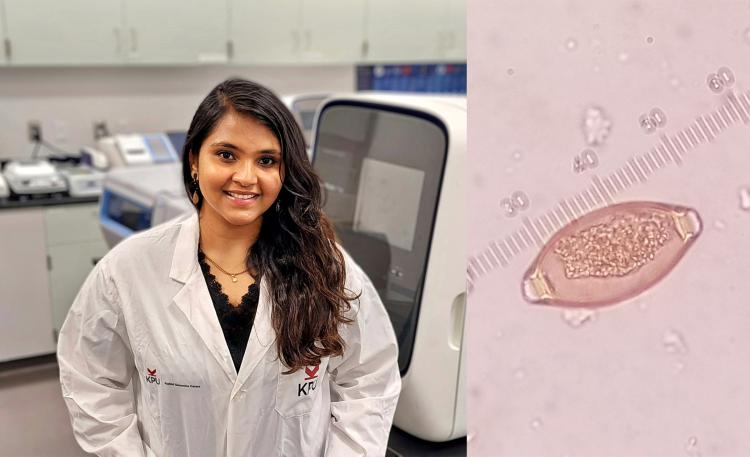A Kwantlen Polytechnic University (KPU) researcher is part of a team that has discovered a potential new species of parasitic roundworm one that is resistant to treatment.

Dr. Abhinaya Venkatesan (left) and a Trichuris egg (right)
The parasite, named Trichuris incognita, presents symptoms similar to a species called Trichuris trichiura, which is more commonly known as whipworm for its shape, and infects millions of people worldwide.
It's most common in warm, moist, tropical and subtropical regions, particularly those where access to water, sanitation and hygiene is poor. Children are most vulnerable to infection, which can cause abdominal pain, diarrhea, dysentery, rectal prolapse, and long-term effects, including stunted growth and impaired cognitive development, according to the World Health Organization (WHO).
One key difference, however, is that the new species doesn't respond as well to treatment that was recently recommended by the WHO.
The discovery was made in a West African parasite population during a study led by Dr. Abhinaya Venkatesan, a researcher at KPU's Applied Genomics Centre. The research was completed as part of her PhD thesis under the supervision of Dr. John Gilleard at the University of Calgary.
"We worked with the Swiss Tropical and Public Health Institute, and they initially wanted to examine how effective two drugs ivermectin and albendazole could be against Trichuris trichiura when combined, which was recommended by the WHO," says Venkatesan. "Once they found that the treatment wasn't working well, they collaborated with us to utilize genomics techniques to investigate potential genetic differences in the population."
The study, which was published in Emerging Infectious Diseases, found that this combination showed a 98 per cent success rate in Tanzania and Laos, but was much less effective in Côte d'Ivoire, where it had less than a 70 per cent success rate pointing to possible genetic differences in the parasite population.
To get a closer look at the parasite's genetic makeup, the team tested Trichuris eggs and whole worms found in stool samples of patients in the region. After extracting and sequencing DNA from the eggs and worms, the researchers confirmed that the parasite in Côte d'Ivoire was indeed genetically different from that in the other two countries.
Venkatesan says the long-term use of anthelmintics, which are drugs used to treat parasitic worms, may have led to the rise of drug resistance, adding that the discovery of this genetically distinct parasite species will significantly impact the WHO's treatment plan to target the infection.
"Antimicrobial resistance is a very hot topic right now because, over the course of many decades, humankind has faced numerous bacterial, viral and parasitic infections, but has come up with few drug classes to combat them.
"The WHO is treating billions of people with the same two or three drugs, and there isn't a lot of research on drug development itself. When few drugs are being used over the course of decades, the parasites are going to develop resistance to them."
Further research will be needed to determine viable treatment strategies, including the development of new drugs, as well as its spread and prevalence across the globe.
Venkatesan is the Research and Partners Manager at KPU's Applied Genomics Centre, a research lab focused on developing genomic and metabolomic research solutions, primarily for the agricultural sector.









